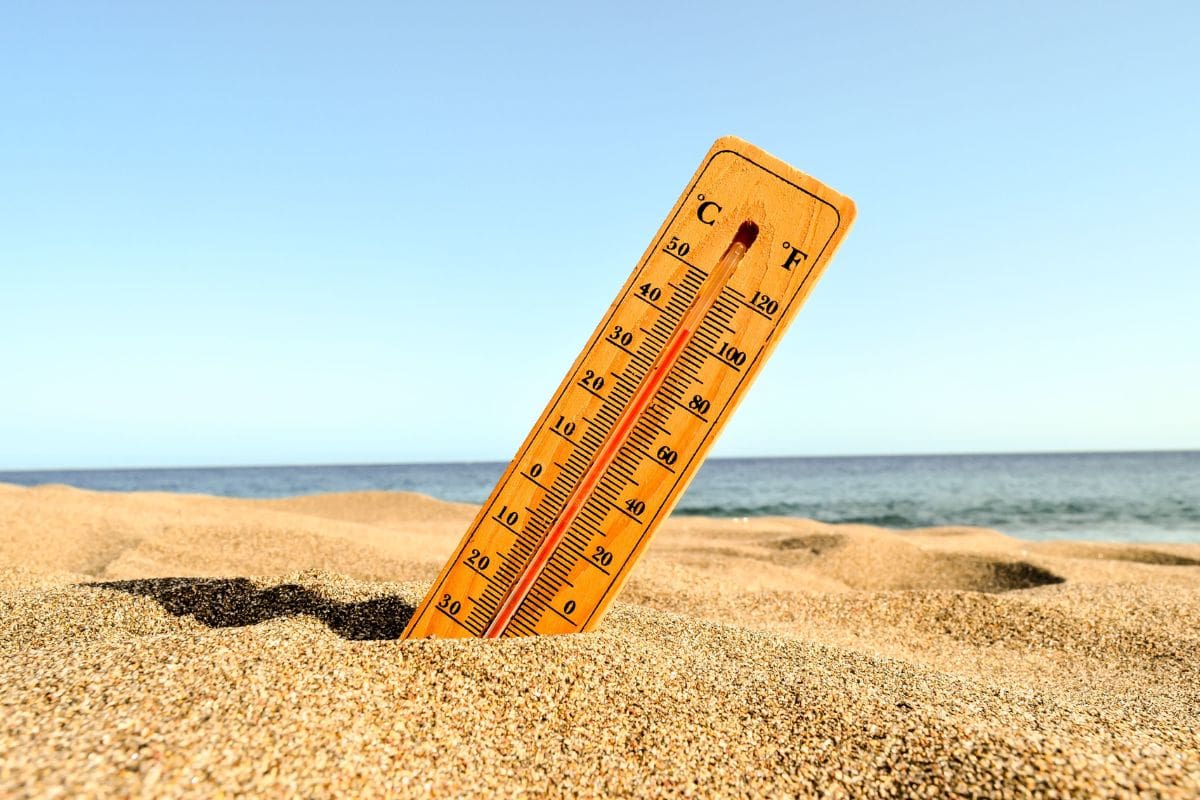Climate change has significant implications for our health in more ways than one, but one of the biggest issues is the risks associated with extreme heat.
For Aussies familiar with long, hot summers, it may sound a tad dramatic, but heatwaves can pose a serious threat to human life. In fact, between 1900 and 2011, extreme heat killed more people than floods, fires and storms.
“A lot of people aren’t aware of how severe a heat stroke can be, or the health implications can be,” explains Dr Michaela Sorensen, a GP based in Sydney. “Extreme heat can especially take a toll and anyone with underlying medical conditions are really prone to decompensating (when an organ or system that usually manage to function, suddenly struggles) in the heat.”
Is it hot, or is it a heatwave?
So, what’s the difference between a hot day, and a heat wave? According to the Bureau of Meteorology (BOM), a heatwave occurs when both daytime and nighttime temperatures are uncharacteristically high for three days in a row. Exactly what constitutes “uncharacteristically high” depends on the climate data for the region. The BOM groups heatwaves into three different categories:
- Low intensity heatwave: the most common type. In low intensity heatwaves, although uncomfortable, most of the population can deal with the conditions.
- Severe heatwave: In severe heatwaves, which are less common, people with pre-existing medical conditions (especially elderly people) may be at risk of health complications.
- Extreme heatwave: The most unusual type of heat-related weather event, extreme heat poses a serious threat to infrastructure (think: power, transport, etc) and can be dangerous for the whole population – even young, fit, healthy people.
What temperature are considered dangerous?
In general, humans struggle when environmental temperature reaches 35ºC. The degree to which the population is acclimatised – and can adapt – to the heat is also an issue. Another factor is how well prepared the infrastructure is to deal with soaring temperatures. (1)
Perspiration and evaporation play a big role in how well we handle heat too, which means humidity is another important factor. “Humidity makes it harder for your body for the sweat to be absorbed off your body so it makes it, you feel the heat a lot more, although temperature might not seem as severe, always check the ‘feels like’ temperature and let that be your guide,” says Dr Sorensen. “In humid conditions it will feel much hotter than the actual temperature.” High humidity can reduce and prevent evaporation from skin causing the heat trapped inside the body. (2) Indoor humidity can support the growth of mould and bacteria that potentially leads to respiratory problems, including asthma. (2)
What are the health risks poses by a heatwave?
“Our bodies are designed to operate at a narrow temperature range,” says Dr Sorensen. When the temperature rises, our bodies sweat to try and cool us down, which means you get dehydrated. “Sweating means we lose a lot of water but also electrolytes. Water and electrolytes aren’t just important for staying hydrated but play a crucial role in helping the organs function,” explains Dr Sorensen. “The classic example is the heart – it requires a narrow, precise balance of sodium and potassium levels to contract and push blood around.”
What is heat stroke?
“Heat stroke is the layman’s term given to anyone suffering from severe heat exhaustion,” explains Dr Sorensen. “The signs start off mild, and progress and become more severe the longer you’re out and exposed to the heat.” Some of the most common symptoms are feeling dizzy or light-headed, weakness, nausea and vomiting, muscle cramping, headaches, irritation, and swelling in the lower limbs.
In extreme cases, you can lose consciousness, and worsen chronic conditions, such as cardiovascular problems, respiratory issues, cerebrovascular disease and diabetes-related conditions. The stress of dealing with high temperatures can also take a toll emotionally, with heatwaves contributing to anxiety and other mental health problems. (3)
Who is the most at risk of health problems related to extreme heat?
“We do know as we age, our body doesn’t compensate with extreme heat as well,” explains Dr Sorensen. “Unfortunately, we accumulate more underlying health conditions, so both those factors combine mean the older you are, the higher your risks of extreme health conditions.”
Anyone who is outside for extended periods during extreme heat also needs to take extra care; people who work outside, or who choose to exercise in the midst of a heatwave can put themselves at risk. “It is multi-factorial, people from lower socio-economic backgrounds are also at higher risk because they are less likely to have the access to air conditioning, and less access to health care. If they were unwell, they’d be harder to seek the treatment,” says Dr Sorensen.
What should you do if you think you might have heat stroke?
“Presenting to your GP is a sound first step,” says Dr Sorensen. “If you, or someone you know finds themselves suffering from the more extreme symptoms – loss of consciousness, vomiting, etc, it’s best to present to your local hospital’s emergency department.” Once you arrive, you’ll likely be given IV rehydration (a drip) and potentially given medication for nausea and vomiting. “They’ll also check your electrolytes and fluid balance, and may do an ECG to make sure your heart is functioning.”
Relate: How to prep and what to drink during a heat wave
Reference
- World Health Organisation. Heatwaves [Internet]. www.who.int. 2022 [cited 2023 Sep 22]. Available from: https://www.who.int/health-topics/heatwaves#tab=tab_1
- World Health Organisation. WHO HOUSING AND HEALTH GUIDELINES [Internet]. World Health Organaisation; 2018 [cited 2023 Sep 22]. Available from: https://www.ncbi.nlm.nih.gov/books/NBK535293/pdf/Bookshelf_NBK535293.pdf
- World Health Organization. Heat and Health [Internet]. World Health Organization. 2018 [cited 2023 Sep 22]. Available from: https://www.who.int/news-room/fact-sheets/detail/climate-change-heat-and-health


